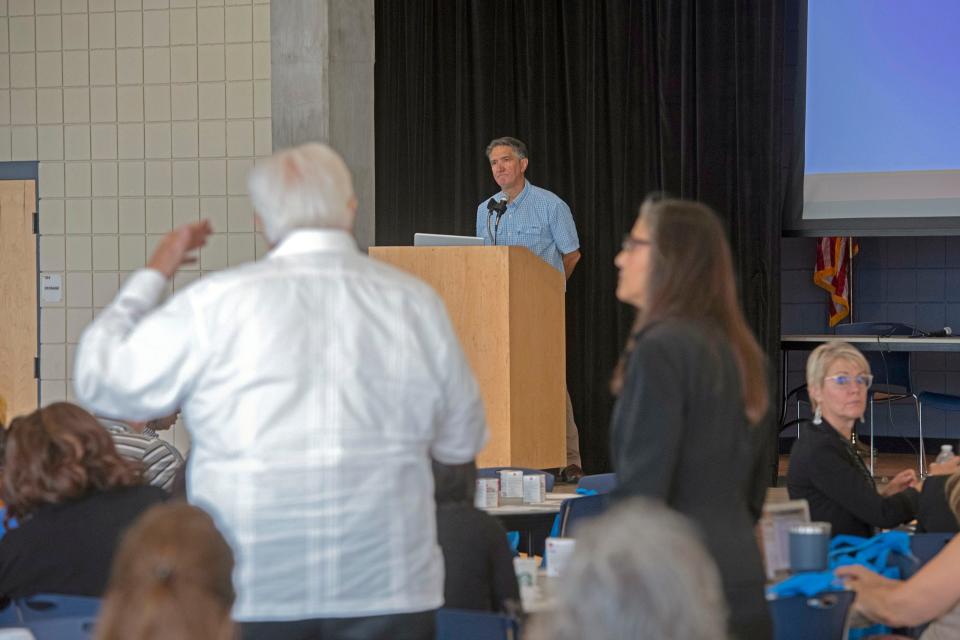From medication to incarceration to conversation, Escambia trying everything to curb overdoses
Escambia County is a state leader in opioid overdose death rates. According to Sheriff Chip Simmons, the county recorded 233 fentanyl-related overdoses in 2022.
On Thursday, the mayor, the sheriff, the chief of police and dozens of other public officials and medical professionals came together to discuss why and what can be done about it.
At an Opioid Summit hosted by the substance abuse prevention and education agency CDAC, a broad section of professionals from the community gathered to discuss not only the dangers of drugs like fentanyl, but also the underlying factors which end up pushing individuals into the circumstances of drug abuse and overdose.

Previously: There were 23 opioid overdoses in Escambia last week. New CORE program may turn the tide.
See the numbers: Escambia County has 63% of fentanyl deaths in 4-county area in 2021, deaths increased 48%
During his opening remarks Mayor D.C. Reeves discussed how many cities are dealing with the same issues of fentanyl and drug abuse and are working together to find solutions.
“Mayors across the country are all facing the same issue,” Reeves said. “This is a complex issue and a very, very real one.”
What’s at the root of the issue?
According to Florida Department of Heath data from 2021, the annual overdose rate in Escambia County was 64.6 per 100,000 persons, more than double the state average 31.2 per 100,000 persons.
While the full data set from 2022 is not yet available, law enforcement and health care personnel say they are seeing multiple overdoses every day and as frequently as every third service call. According to the Escambia County Emergency Medical Services Dashboard, EMS teams responded to the scenes of 39 overdoses last week, and 876 so far this year.
Multiple local medical officials, such as Sweneda McDonald and Dr. Mark Stavros, denied the myth that many who become addicted to drugs were seeking out to achieve ‘euphoria’ in the first place.
Instead, many begin on prescribed medications for pain relief and end up developing a dependency on the opioid that can carry on for years without professional treatment or intervention.
Once their medical provider is unable to continue filling their prescriptions, many individuals search for the drugs they ‘need’ out on the street. This increases the likelihood of harm coming to the individual due to the higher chances of street distributors cutting their product with fentanyl, a drug made using precursor chemicals which is also 100 times stronger than the average opioid.
As opioid abuse hijacks the brain, dopamine receptors are tricked into viewing the drug as an essential need on a similar tier as food and water. Simultaneously, the pre-frontal cortex slowly loses its function as the bearer of reasoning and logic.

“Addiction is a disease, not a behavioral disorder or issue,” said Stavros, CEO and medical director of Gulf Coast Addiction Medicine said. “Addiction is also progressive and can result in chronic disease or premature death.”
He later emphasized the importance of family and community intervention in treating addiction. Many individuals can possess a pre-disposition for addiction due to family history or Adverse Childhood Experiences — such as experiencing or witnessing violence, abuse or neglect — that can put them on a fast track to drug abuse.
According to the U.S. Centers for Disease Control and Prevention, individuals who experience four or more ACEs are 11 times more likely to seek out drugs as a form of pain management. Individuals who experience six or more ACEs lose 20 years of life expectancy.
Why some go down the path of addiction
For individuals battling addiction, and especially those dealing with opioids, the journey of rehabilitation and treatment is often navigated alone.
As such, McDonald, who leads Lakeview Center's Medication Assisted Treatment program, and her clinic take a ‘whole person’ approach to treatment which encapsulates looking past the disease and instead focusing on the patients' well-being and ensuring they understand that they are cared for.
Additionally, they emphasize the importance of language and empathy when interacting with the patients. Small gestures such as saying ‘thank you’ after showing vulnerability demonstrates the lengths to which language can play a role in treatment.

This helps to reinforce hope and resilience within patients, thus leading to less feelings of immediate loneliness.
“It’s important that they feel the treatment and space are theirs,” said McDonald. “The amount of appreciation many of our patients show when someone can remember their name without checking is sad, but understandable considering the circumstances they’re often dealing with.”
If left without resources or support, it is likely that individuals afflicted by addiction may spiral until they are met by incarceration or death.
What’s being done?
Sherriff Chip Simmons expressed a strong conviction to head the fight against the opioid crisis in Escambia County and said that sheriff deputies have prioritized drugs, and specifically fentanyl.
“Drugs [and] fentanyl, obviously, can kill, but drugs also lead to gun violence … they go hand-in-hand,” Simmons said. “We’re working with federal authorities on fentanyl cases, trafficking cases, because we take those very serious.”
Assistant State Attorney Frederick V. Longmire assured summit attendees that the courts are taking the fentanyl crisis very seriously too.
Harsher sentences for possession and distribution charges involving fentanyl have been implemented to scare dealers into going out of business. Possessing four grams of fentanyl can land an individual, at the minimum, seven years of prison and a $50,000 fine.
Still, Longmire explained that the states works to treat those suffering from addiction with dignity and have a treatment-based drug court as an alternative to incarceration for defendants who enter the judicial system because of addiction.
Speaking to what the community can do to help curb the opioid crisis, officials stressed that it is crucial to be supportive to those in need and to provide education to those who are unaware of the realities of addiction.
“Educating the youth on these kinds of issues are a necessity,” said McDonald. “Shifting the conversation surrounding drug abuse, addiction and fentanyl to a less-judgmental tone is also key.”
This article originally appeared on Pensacola News Journal: Escambia and Pensacola addiction experts join forces to find solutions

